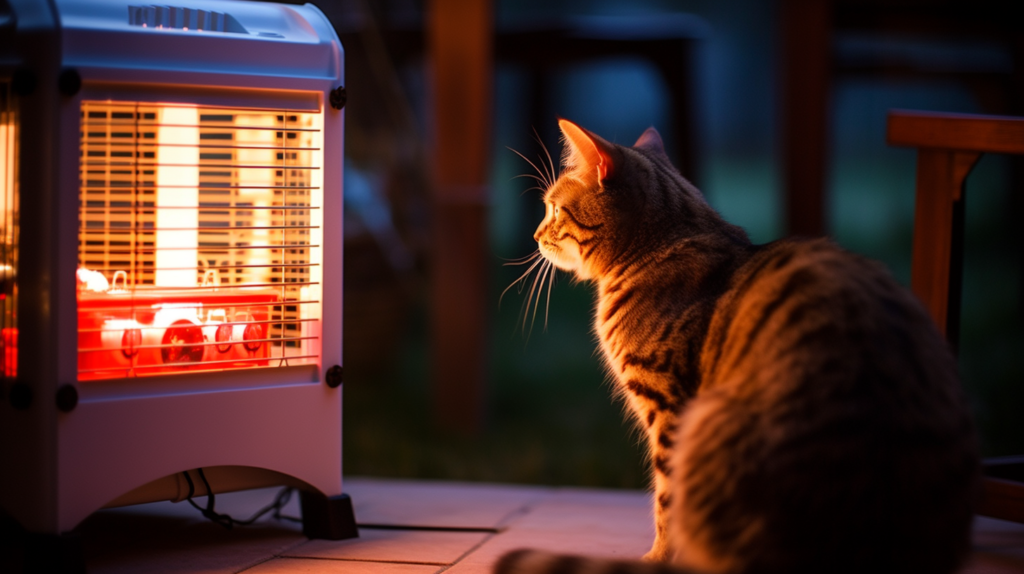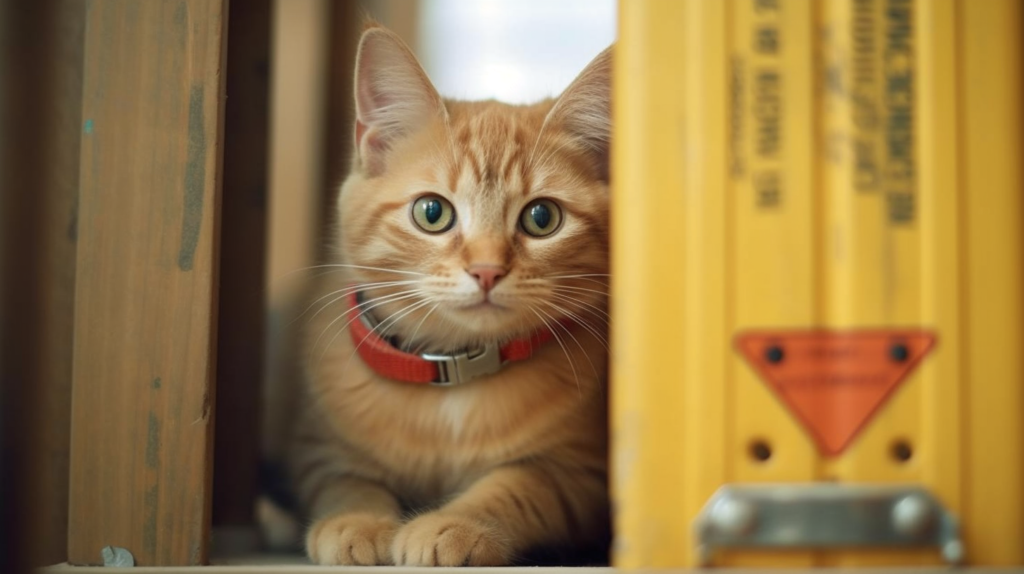Introduction
Imagine a warm summer evening where you and your beloved feline companion enjoy the peaceful serenade of crickets while soaking up the gentle breeze. As the sun sets and darkness envelops your garden, you flick on your bug zapper, confident it will keep those pesky insects at bay. However, there is a question that remains: could this seemingly harmless device pose a threat to your beloved pet? Can a Bug Zapper Kill a Cat?
Understanding Bug Zappers
Bug zappers are commonly used to get rid of insects., utilizing UV light to lure and electric grids to eliminate bugs. They come in different styles—UV light traps, electric grids, and sticky traps. Here’s how they work:
- UV Light Traps: Insects are attracted to the UV light and then electrocuted upon contact with the grid.
- Electric Grids: These directly zap any insect that touches the electrified wires.
- Sticky Traps: Instead of electrocution, these traps use an adhesive surface to capture bugs.
While designed for insects, it’s important to consider if they could inadvertently affect cats.
Despite their popularity, the question remains: are they completely safe for our four-legged companions? Let’s inspect their safety features and the science behind why they’re generally considered safe for pets.
Can A Bug Zapper Kill A Cat?
The concern for the safety of our feline friends around bug zappers is understandable, but rest assured, these devices are designed with safety in mind and are not lethal to cats. When it comes to the zapper’s voltage, figures range from 500 to 4,000 volts—impressive numbers, but not the full story. The actual risk to pets is more accurately gauged by the amperage, which is less than 0.5 milliamps for bug zappers; a tiny amount compared to the 15-20 amps delivered by household power outlets.

In terms of design, bug zappers provide features that act as safeguards:
- Grid Design: The grids are typically narrow and encased, deterring cats from direct contact.
- Protective Housing: A layer of plastic often surrounds the electric grid for added protection against curious paws.
Despite these safeguards, vigilance is key. Keep bug zappers out of paw’s reach, especially if your cat shows a penchant for hunting the zapped insects. While these insects are unlikely to be a meal, they may carry toxins or have been exposed to chemicals that could be harmful if ingested.
Debunking the Myth
There are stories online about cats getting hurt by bug zappers. But it’s important to be cautious and look at the scientific evidence to find out what’s true.

The pervasive belief that bug zappers can be fatal to cats has caused concern among pet owners. To address this fear, let’s dissect the facts:
Scientific Evidence
- Studies: Extensive research shows that the risk of a bug zapper harming a cat is exceptionally low.
- Expert Opinions: Veterinarians and wildlife experts agree that the design of bug zappers makes them unlikely to be a threat to pets.
Design Features
- Grid Size: The grids are too small to allow a cat’s paw through.
- Electrical Current: The current is calibrated to kill small insects, not large animals.
- Safety Measures: Most have protective casings to prevent accidental contact.
Real-World Observations
- Lack of Reports: There is a scarcity of verified incidents involving cats being harmed by bug zappers.
- Pet Behavior: Cats typically show little interest in bug zappers once installed.
Scientific studies and experts say bug zappers don’t hurt cats. They have features that make them safe for cats, like small grids and low electrical currents. The distance between the grid and surfaces also helps prevent harm.
The electrical current in bug zappers is typically low and not strong enough to cause significant harm to animals with larger body mass, such as cats. Additionally, the distance between the electrified grid and other surfaces ensures that any potential contact is unlikely, further reducing the risk.
Can Cats Get Poisoned By Bug Spray?
Cats can be poisoned by bug spray, including insecticides used for pest control and lawn treatments. Applying flea treatments made for dogs to cats can also be dangerous. Cats can be affected by simply walking on treated areas or being near animals that have been sprayed.
Symptoms of poisoning include excessive salivation, shaking, vomiting, diarrhoea, and seizures. If you suspect your cat has been exposed to toxic chemicals, seek veterinary care immediately. To prevent accidental exposure, store insecticides and flea treatments securely and clean up any spills. When using insecticides on lawns, keep your cat indoors or in untreated areas. These precautions will help keep your cat safe and healthy.
Potential Risks to Pets

While bug zappers may not directly kill cats, To ensure the safety of our pets, it’s essential to recognize the potential risks of using these devices.
One concern is that curious cats might investigate bug zappers and accidentally touch the electrified grid. While the risk of serious injury is low, it is still advisable to prevent such scenarios by keeping bug zappers out of reach or installing them in areas inaccessible to pets.
Bug zappers generate debris when they eliminate insects, posing another risk. If insects fall from the device, cats may be curious and try to eat them. Exposure to chemicals such as insecticides can be harmful if insects come into contact with them. It is crucial to exercise caution and be mindful of insects that fall from bug zappers to ensure cats’ safety.
Learn More About Your Cats - 1. Can Cats See Fire? 2. Separation Anxiety in Cats 3. Why Do Cats Sleep at Your Feet? 5 Reasons
Ensuring Pet Safety
To safeguard our furry companions and minimize any potential risks, here are practical tips for pet owners when using bug zappers:

- Placement: Install bug zappers in areas where pets cannot reach them, such as high on walls or ceilings. Avoid placing them in areas your cat frequents, such as near their food or sleeping areas.
- Outdoor Considerations: If using bug zappers outdoors, ensure they are installed in enclosed areas or screened-off sections to prevent access by pets.
- Supervision: When your cat is outdoors, supervise their activities and discourage them from approaching bug zappers. Redirect their attention to more pet-friendly activities or provide alternative forms of entertainment.
- Alternative Methods: If you have concerns about bug zappers, consider using alternative insect control methods that are safe for pets. Natural repellents, pet-friendly insect traps, or citronella candles can be effective alternatives.
Safe Alternatives for Pet Owners
For pet owners who prefer to avoid bug zappers altogether, there are several pet-friendly alternatives for controlling insects:
- Natural Repellents: Certain plants, such as lavender, marigold, and citronella, have natural insect-repellent properties. Placing these plants in your garden or using essential oils derived from them can help deter insects without posing a risk to your cat.
- Indoor Insect Traps: Indoor insect traps that use non-toxic sticky boards or pheromone attractants can effectively capture and control insects without harming your pet.
- Outdoor Insect Traps: Pet-friendly outdoor insect traps that use attractants specific to insects like mosquitoes or flies can help reduce populations without endangering your cat
Are Bug Zappers Harmful to Cats and Their Eyesight?
Bug zappers can cats see fire and may be harmful to their eyesight. The bright light emitted by bug zappers can attract cats, and if they get too close, it can potentially damage their sensitive eyes. It’s important to keep bug zappers out of reach of pets to prevent any potential harm.
Conclusion:
In the realm of bug zappers and cat safety, it is crucial to separate fact from fiction. While bug zappers are designed to eliminate insects and may pose minimal risks to pets, the popular myth that they can kill cats is unfounded.
FAQ
Can a bug zapper electrocute or kill a cat?
While bug zappers use electric grids to eliminate insects, the risk of electrocution or fatal harm to cats is minimal. The voltage and current levels are typically too low to cause severe damage to a cat.
Are bug zappers safe to use around cats?
Bug zappers can be safely used around cats if proper precautions are taken. Positioning the bug zapper in areas inaccessible to cats and ensuring it has appropriate safety features minimizes potential risks.
Do bug zappers emit harmful ultraviolet (UV) light that can harm cats’ eyes?
Bug zappers emit UV light as part of their attraction mechanism. Still, the levels are usually low and not harmful to cats’ eyes. However, keeping cats from directly staring at the light source is still advisable.
Can a curious cat get injured by touching a bug zapper?
It is unlikely for a curious cat to get injured by touching a bug zapper. Bug zappers are designed with protective grids and other safety features to prevent accidental contact. However, it’s best to discourage cats from interacting with the zapper.
What are some alternative methods for controlling insects without using bug zappers?
There are several cat-safe alternatives for insect control, such as natural repellents, citronella candles, mosquito nets, or screens on windows and doors. These methods can help keep insects at bay while ensuring your cat’s safety.
Should I consult a veterinarian about bug zappers and my cat’s safety?
It is always a good idea to consult a veterinarian for personalized advice regarding bug zappers and your cat’s safety. They can provide specific guidance based on your cat’s breed, age, and behaviour, ensuring the well-being of your furry friend.
Can bug zappers be used indoors with cats around?
Indoor bug zappers can be used safely around cats if placed in areas where the cats cannot access them. However, it is essential to be cautious and monitor your cat’s behaviour to ensure they do not come into direct contact with the zapper.
How can I keep my cat safe from bug zappers while allowing them outdoor access?
To keep your cat safe from bug zappers outdoors, ensure the zapper is installed in an inaccessible area, such as on a high pole or securely mounted on a wall. Additionally, supervise your cat’s outdoor activities and redirect their attention away from the zapper.

Hello there, I am Iftekhar Ahmed. I am the owner of Mishka & The Cat Corners. I love to explore and write on various topics about cats

